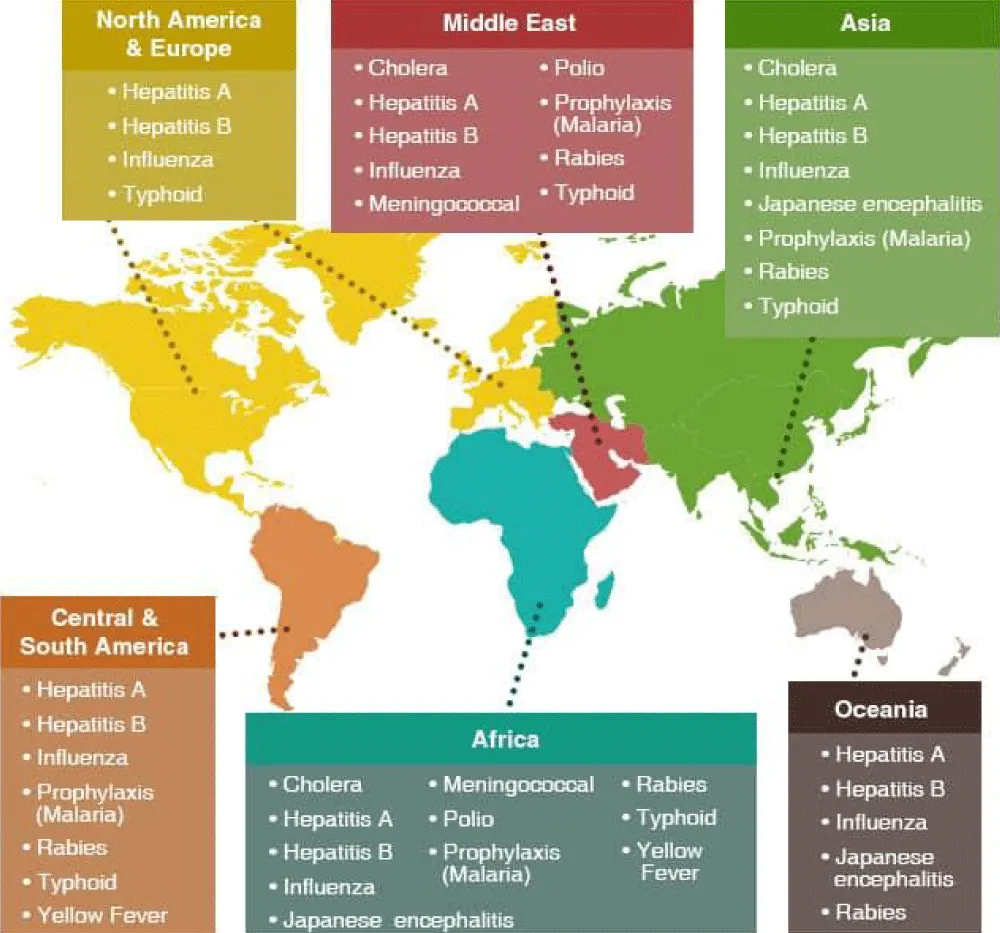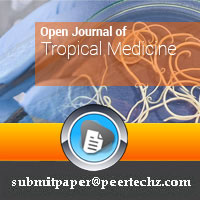Open Journal of Tropical Medicine
How to assess the Immunization Requirements of a Person Traveling from a Developed Country to a Developing Country
Jeyatheepan Jeyaretnam*
SP.MSC, International Medical and Scientific Coordinator, Leg Clinics Net (Klinik Piano AG), Department of General Medicine, Instrumental Lymph Drainage Approaches, Switzerland
Cite this as
Jeyaretnam J. How to assess the Immunization Requirements of a Person Traveling from a Developed Country to a Developing Country. Open J Trop Med. 2025;9(1):001-003. DOI: 10.17352/ojtm.000027Copyright
© 2025 Jeyaretnam J. This is an open-access article distributed under the terms of the Creative Commons Attribution License, which permits unrestricted use, distribution, and reproduction in any medium, provided the original author and source are credited.Travel medicine is a branch of medicine that deals with the prevention and treatment of medical problems in international travelers. The Tropical and Travel Medicine activity is aimed at the prevention and treatment of diseases related to travel, in particular infectious diseases. These activities are generally integrated into the Infectious Diseases Department of the Central Hospital. This division not only deals with travel medicine, but also brings together all areas related to infectious diseases: physician consultation in infectiology, microbiology, infection prevention and control (or Hospital Hygiene or Hospital Epidemiology), Screening for HIV/AIDS and other sexually transmitted diseases, and control of infectious diseases. This review focuses on the indications for each travel-related vaccine, as well as a structured summary and visuals depicting the geographical distribution of important travel-related diseases and highlighting high-risk destinations and behaviors. It is meant to provide persons traveling to developing nations from developed countries with important information regarding the notion of preventive immunization or vaccination.
Introduction
International travelers, especially those from industrialized countries to developing countries, should be prepared for their trip according to the principles of risk management. Precautionary strategies and medical interventions should be based on the itinerary, pre-existing health factors, and specific traveler behaviors. A structured approach to patient interaction provides a general framework for effective counseling and is essential. Immunization-related diseases play an important role in travel-related illnesses, and their impact is not limited to exotic diseases in developing countries. Hence, a pre-travel booster is the ideal time to brush up on age-appropriate vaccinations and protect against diseases that may pose additional risks to travelers and may be related to their destinations or activities.
This review focuses specifically on the indications for each travel-related vaccine, as well as a structured summary and graphics showing the geographic distribution of major travel-related diseases and highlighting high-risk destinations and behaviors. Dosing, route of administration, need for booster shots, and possible accelerated schedules for pretravel vaccinations are to be considered by the physician and advisable to the patient’s intended travel. Different underlying diseases and medications result in varying degrees of immunodeficiency, and there are still many unknowns in this area. Recommendations for immunization of immunocompromised travelers are less well established than for other categories of travelers. This assessment is intended to provide people traveling to developing countries from developed countries with some relevant information about the concept of preventive immunization or vaccination.
Immunizations
When one is preparing to travel to a developing country, it is important to make sure that both oneself and one’s children have received all routine vaccinations before traveling. The routine vaccinations include seasonal flu, tetanus-diphtheria-pertussis (TDP or Tdap), Measles-Mumps-Rubella (MMR), varicella (chickenpox) for children and zoster (shingles) for adults, Pneumococcus (PCV13 or PPSV23), hepatitis A and B, polio, meningococcus, Haemophilus influenzae type b (Hib) - for children or adults with immune system problems - and rotavirus (for infants only).
Depending on the itinerary and the specifics of one’s medical history, they may also need vaccinations for crossing international borders. While there are 3 vaccines that are required to enter and exit certain countries. Included in these 3 vaccinations are the measles polio vaccine a one-time booster that is currently required for leaving the country after a stay of more than 4 weeks in Afghanistan, Laos, Nigeria, and Pakistan. Meningococcal vaccine a single dose of the quadrivalent ACWY meningococcal vaccine is required for entry into the Kingdom of Saudi Arabia for the Hajj. A Yellow Fever vaccination is required by many countries for entry if one is traveling from countries with a Yellow Fever risk [1-3]. Also necessary include the typhoid vaccine (available in both oral and injectable forms), the Japanese encephalitis vaccine, and the pre-exposure rabies and tick-borne encephalitis vaccine [4]. The required vaccinations can also be proven by an international vaccination certificate (yellow card). This must be presented when someone travels to a country that requires proof of vaccination status for entry.
Intestinal diseases
Intestinal diseases are transmitted by contaminated water and food. For example, Typhoid fever is caused by the bacterium Salmonella typhi. The infection causes fever and bloody diarrhea. For the prevention of typhoid, travelers can get an injection or an oral vaccination. Hepatitis A is a viral infection that can cause liver disease and can be transmitted through food and water contaminated with feces. Getting vaccinated against hepatitis A is also possible [5,6].
Yellow fever
Yellow fever is caused by a flavivirus transmitted by an Aedes or Haemogogus mosquito. The illness can range from mild to severe. Early symptoms include flu-like symptoms, but severe courses with jaundice (yellowing), high fever, hemorrhagic bleeding, shock, and organ failure occur in 15% of cases. Untreated, severe yellow fever can be fatal. Thankfully, yellow fever can be prevented by vaccination. Yellow fever vaccine is given as a single dose to people at least 9 months of age who are traveling to or living in high-risk areas [7].
Japanese encephalitis
Japanese Encephalitis (JE), a potentially fatal disease, has high infection rates in countries such as Bangladesh, Cambodia, China, Indonesia, Japan, Nepal, and Thailand. The symptoms can range from a mild flu-like illness to fever, headache, and vomiting. Infection can cause inflammation of the brain (encephalitis), which can lead to coma and paralysis. A vaccine is available to prevent JE. It is licensed for children and adults 2 years of age and older. This vaccine is recommended for travelers who will be in areas where JE is common for more than one month or for travelers who will be in rural or agricultural areas for less than one month [8].
Respiratory viruses
Respiratory viruses range from the common cold to more serious infections. All travelers should take general precautions to protect themselves from respiratory viruses. It is prudent and advisable to keep all immunizations up to date, including seasonal influenza vaccination.
Bird flu, also called avian influenza, is caused by avian (bird) types of influenza A virus. Flu viruses are commonly found in wild birds, especially waterfowl, and can also cause outbreaks in domestic poultry such as chickens, ducks, and geese. The fifth and largest epidemic of H7N9 to date was reported in China in May 2017. Because the risk is currently considered low, however, neither WHO nor CDC has imposed travel restrictions. There is currently a vaccine available to prevent H5N1. No vaccine is available for H7N9 [9].
Coronavirus - Disease 2019 (COVID-19)
Finally, from last experience 2019 Coronavirus Disease (COVID-19). SARS associated coronavirus 2 (SARS-CoV-2), formerly also called 2019 Novel Coronavirus (2019-nCoV), is a newly identified coronavirus responsible for an outbreak of coronavirus disease (called COVID-19) that began in Wuhan City, China, in December 2019. SARS-CoV-2 infection causes respiratory illness that can range from no or mild symptoms to respiratory failure and death. It is believed that COVID-19 is transmitted from person to person through infected droplets. The symptoms of COVID-19 occur within 2 to 14 days of exposure and include fever, cough, and shortness of breath. It seems that the risk of more severe COVID-19 disease is higher in the elderly or people with chronic health problems. There is currently no vaccine to prevent COVID-19. Avoiding contact with the virus, including avoiding travel to known outbreak areas, is the best way to prevent this infection. Currently, the CDC recommends against travel to China and that travelers from China be tested and isolated for up to 14 days. This situation is rapidly evolving [10].
Conclusion
When traveling, one is exposed to different types of viruses that are not found in one’s home country, which means one may have no immunity or protection against them. A consultant in travel medicine can suggest vaccinations that protect against preventable diseases such as typhoid or hepatitis A, depending on one’s previous vaccinations and destination. Specialists in travel medicine can also determine which routine vaccinations are no longer up to date and need to be refreshed, such as the flu vaccination. These vaccinations can protect one from infections that could otherwise seriously endanger one’s health.
- Shinefield H, Black S, Thear M, Coury D, Reisinger K, Rothstein E, et al. Safety and immunogenicity of a measles, mumps, rubella and varicella vaccine given with combined Haemophilus influenzae type b conjugate/hepatitis B vaccines and combined diphtheria-tetanus-acellular pertussis vaccines. Pediatr Infect Dis J. 2006;25(4):287–92. Available from: https://doi.org/10.1097/01.inf.0000207857.10947.1f
- Di Pietrantonj C, Rivetti A, Marchione P, Debalini MG, Demicheli V. Vaccines for measles, mumps, rubella, and varicella in children. Cochrane Database Syst Rev. 2020;4(4):CD004407. Available from: https://doi.org/10.1002/14651858.CD004407.pub4
- World Health Organization. INTERNATIONAL TRAVEL, AND HEALTH – 01 JULY 2020, country vaccination requirements and WHO recommendations for international travelers and malaria prophylaxis per country [Internet]. Geneva: WHO; 2020. Available from: https://www.who.int/docs/default-source/documents/emergencies/travel-advice/yellow-fever-vaccination-requirements-country-list-2020-en.pdf
- Pavli A, Maltezou HC. Travel vaccines throughout history. Travel Med Infect Dis. 2022;46:102278. Available from: https://doi.org/10.1016/j.tmaid.2022.102278
- Amicizia D, Micale RT, Pennati BM, Zangrillo F, Iovine M, Lecini E, et al. Burden of typhoid fever and cholera: similarities and differences. Prevention strategies for European travelers to endemic/epidemic areas. J Prev Med Hyg. 2019;60(4):E271–85. Available from: https://doi.org/10.15167/2421-4248/jpmh2019.60.4.1333
- Balogun O, Brown A, Angelo KM, Hochberg NS, Barnett ED, Nicolini LA, et al. Acute hepatitis A in international travellers: a GeoSentinel analysis, 2008-2020. J Travel Med. 2022;29(2):taac013. Available from: https://doi.org/10.1093/jtm/taac013
- Simon LV, Hashmi MF, Torp KD. Yellow Fever. In: StatPearls [Internet]. Treasure Island (FL): StatPearls Publishing; 2023 [cited 2023]. Available from: https://www.ncbi.nlm.nih.gov/books/NBK470165/
- Yun SI, Lee YM. Japanese encephalitis: the virus and vaccines. Hum Vaccin Immunother. 2014;10(2):263-279. Available from: https://doi.org/10.4161/hv.26902
- Mancuso G, Midiri A, Gerace E, Biondo C. Bacterial antibiotic resistance: the most critical pathogens. Pathogens. 2021;10(10):1310. Available from: https://doi.org/10.3390/pathogens10101310
- Dhama K, Khan S, Tiwari R, Sircar S, Bhat S, Malik YS, et al. Coronavirus Disease 2019-COVID-19. Clin Microbiol Rev. 2020;33(4):e00028-20. Available from: https://doi.org/10.1128/CMR.00028-20
Article Alerts
Subscribe to our articles alerts and stay tuned.
 This work is licensed under a Creative Commons Attribution 4.0 International License.
This work is licensed under a Creative Commons Attribution 4.0 International License.



 Save to Mendeley
Save to Mendeley
